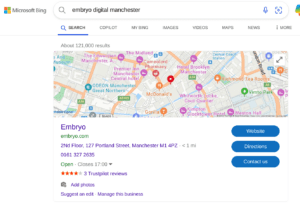If you’re an Ecommerce SEO agency or business owner, you’ll know that Google is the king of search engines. With Google being the most popular search engine in the world, it’s understandable that SEO specialists dedicate hours of their day analysing Google’s algorithm and creating local SEO content for this singular search engine.
However, if you’re only focussing on Google, you miss out on potential traffic from other search engines. Local SEO goes beyond just Google, and identifying how to trend and rank on other SERPs, is a valuable way of generic traffic for your clients.
Want to know how to achieve top rankings in alternative search engines? Stick around and we’ll give you some of our best tips.
What is local SEO?
Local SEO is content that has been optimised on a webpage or website to rank for local search results. If you have a physical business in a specific location, local SEO should be part of your strategy and is a great way of attracting traffic and potential customers.
These are the areas of SEO you would usually focus on to boost visibility on local results pages:
- NAP ( Name, Address and Phone number) – ensuring you have your business details, especially your address, is key as you’re more likely to appear in results pages that include a location-related keyword.
- Local/location keywords – Optimise your content using location-specific keywords and terms. If you’re ranking for ‘SEO agency’, use ‘SEO agency Manchester’ to increase your chances of ranking locally.
- Google Maps ratings and user reviews – Building up reviews (positive ones) and interacting with customer reviews helps to show Google your trustworthiness and can increase your SERP rankings.
- Building local backlinks – Link building with other local companies and businesses is a great way to increase your visibility and company reputation.
What are some alternative search engines for local SEO?
If you’re looking to find ways of ranking in other areas for local SEO, you’ll need to know what alternative search engines are available and why you should utilise them.

Bing is the second most popular search engine, falling right under Google’s number one spot and it’s a search engine you have to utilise. Bing has more than 500 million monthly unique visitors and in the UK, it makes up 3.85% of search engine shares.
Whilst this doesn’t seem like much thanks to massive the 93.75% that Google holds, it still holds the second largest amount of shares. Bing is also usually the default browse on Windows devices, so getting your local SEO onto Bing is sure to reach a large amount of users.
![]()
Yahoo has remained fairly popular despite losing the top spot to Google. Yahoo News is the most well-known and prominent feature of the search engine. This old but reliable search engine still holds 2.67% of global search engine shares and should be utilised when targeting local SEO.
Duck Duck Go has become a big alternative in recent years for those who value their privacy. The engine boasts relevant and local results without tracking or storing user information. This is a search engine for those who are conscious of cookies and want their personal information kept offline. With around 100 million daily searches, you won’t want to miss using this search engine.
How do I optimise local SEO for other search engines?
Learning local SEO can be tricky. Now you know why you should use other search engines, but how do you rank on them? Let’s get into how you can appear in other areas with your local SEO.
Understand the ranking algorithms of different search engines
To know how to rank on each search engine, you’ll need to research the elements of local SEO that different search engines favour. Analysing what content each search engine prefers allows you to tailor your local SEO to different options like Bing and Yahoo and increase your chances of ranking independently on each site.
Input location data in each search engine directory
Just as you would list your company data in Google’s directory (Google My Business) ensure your location data is up to date and submitted to each search engine’s directory.
As an example, for Bing, this would be Bing Places. If you have a physical business or store, adding your location details is an essential step to securing local rankings.

Focus on relevant and high-quality local content
Many search engines prefer quality writing with engaging local content that is informative for local searches. Whilst you might tend to focus on extensive keyword research when trying to rank on Google, instead adjust your content to focus more on answering user queries and addressing local issues and topics.
What makes great content? Relevancy.
There are a number of other ways you can utilise your local SEO and we’ve created a special Local SEO checklist to help improve your rankings.
Ace local SEO with Embryo
If you to smash the local rankings and keep your business in the top search results for an area, we have an expert SEO team who’ll be able to customize a strategy just for you to maximise your online visibility across many search engines.
Get in touch today and one of our friendly team members will talk you through the next steps.
FAQs
Answered by Amy Leach
What proportion of all UK searches happen on Google?
As of March 2024, Google was the most popular search engine by far with a 93.61% market share. Bing was placed second with a 3.94% market share
Will optimising for Bing harm my Google ranking?
Bing and Google do have different algorithms which determine the order of rankings on the SERP. This means you could rank #1 on Google, but have a slightly different result on Bing. We would recommend optimising for Google because of the search user numbers, and Bing results should closely follow.
Is the ranking of domains extremely different between search engines?
The ranking of domains is likely to be different across search engines because they all have different ranking algorithms. While these differences are not hugely different, you can expect to see your domain at different positions across the SERPs.
Should I still optimise first for Google?
By optimising for Google you are giving your domain the best possible chance of being seen by a larger audience. For SEO strategies which involve targeting internationally, you may have to consider the popularity of search engines across different countries.















